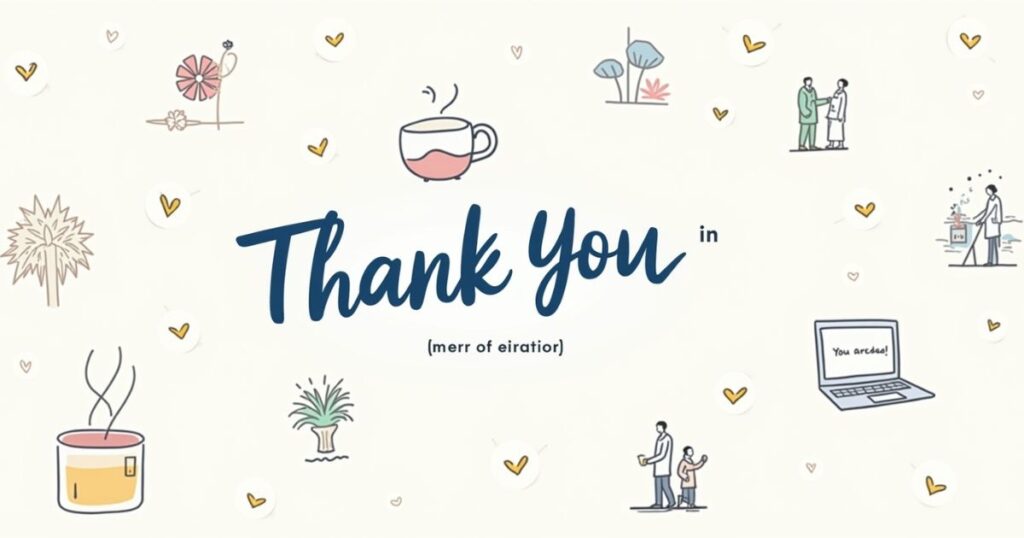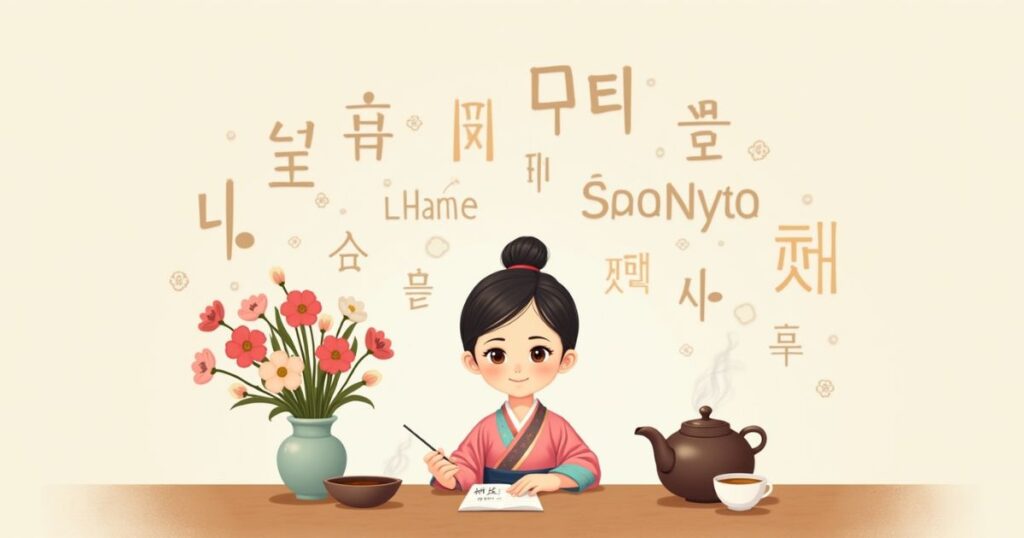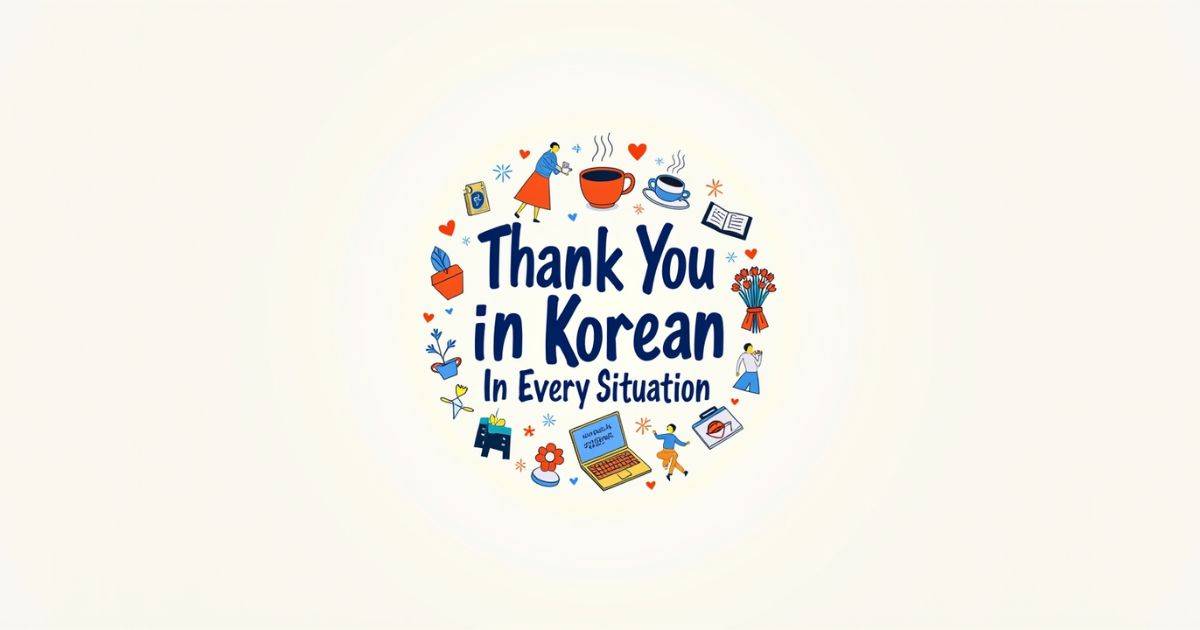Learning how to say thank you in Korean is important if you love Korean culture. Saying thank you Korean style shows respect and kindness. In daily life, knowing how to say thank.you in Korean can help you connect better with native speakers. Whether you are traveling or chatting online, a simple thank you in Korean goes a long way.
There are many ways to say thank you in Korean. You can say “감사합니다” to sound polite. Or use “고마워” with friends. If you want to say thank you so much in Korean, you can say “대단히 감사합니다.” Some people even search for thabk you in Korean by mistake! No worries, you are learning. Just remember, using thank you Korean expressions will always leave a good impression. Practice daily and make it part of your habit.
How Do We Say Thank You in Korean in Formal Language
When you want to express polite gratitude, learning to say “thank you in Korean” formally is important. Formal Korean is used with elders, teachers, or in official settings. Using the right words shows respect. Here’s a guide to formal expressions for saying “thank you in Korean” with genuine politeness and care.
- 진심으로 감사합니다 (Jinsimeuro gamsahamnida): A heartfelt way to say “thank you sincerely” to someone respectfully.
- 매우 감사합니다 (Maeu gamsahamnida): A formal expression meaning “thank you very much” with added intensity of feelings.
- 대단히 감사합니다 (Daedanhi gamsahamnida): This means “thank you greatly” and is often used in important or official situations.
- 진정으로 감사드립니다 (Jinjeong-euro gamsadeurimnida): A very respectful and sincere way to say “I truly thank you.”
- 고맙게 생각합니다 (Gomapge saeng-gaghamnida): A formal sentence meaning “I am thankful” or “I appreciate it very much.”
- 정말로 감사드립니다 (Jeongmallo gamsadeurimnida): Another intense and deeply formal way to say “thank you so much.”
- 성심껏 감사드립니다 (Seongsimkkeot gamsadeurimnida): Means “thank you with all my heart” used formally for deeper gratitude.
- 진심 가득 감사드립니다 (Jinsim gadeuk gamsadeurimnida): “Thank you with full sincerity” said in very formal, polite contexts.
- 깊이 감사드립니다 (Gipi gamsadeurimnida): “Thank you deeply” used to express profound and formal gratitude.
- 무한히 감사드립니다 (Mohini gamsadeurimnida): This means “thank you infinitely,” an extremely polite and powerful phrase.
- 정중히 감사합니다 (Jeongjunghi gamsahamnida): A highly respectful and formal way to say “thank you.”
- 항상 감사드립니다 (Hangsang gamsadeurimnida): “I am always thankful” used politely in formal letters or speeches.
- 변함없이 감사드립니다 (Byeonham-eobs-i gamsadeurimnida): “Thank you unchangingly,” expressing timeless, formal gratitude.
- 크나큰 감사드립니다 (Keunakeun gamsadeurimnida): “Thank you immensely” is used in formal appreciation speeches.
- 공식적으로 감사합니다 (Gongsikjeogeuro gamsahamnida): “Officially thank you” used in business or corporate settings.
- 마음 깊이 감사드립니다 (Maeum gipi gamsadeurimnida): “Thank you from the bottom of my heart” spoken formally.
- 진실로 감사드립니다 (Jinsillo gamsadeurimnida): “Thank you truly” – a strong, formal phrase of gratitude.
- 항상 기억하며 감사드립니다 (Hangsang gieokhamyeo gamsadeurimnida): “Thank you, always remembered” in a very respectful tone.
- 너그럽게 감사드립니다 (Neogeureobge gamsadeurimnida): “Thank you generously” said with formal respect.
- 정성껏 감사드립니다 (Jeongseongkkeot gamsadeurimnida): “Thank you with sincerity and care” in very formal speech.
- 세심하게 감사드립니다 (Sesimhage gamsadeurimnida): “Thank you thoughtfully” showing attention and respect.
- 최선을 다해 감사드립니다 (Choeseoneul dahae gamsadeurimnida): “Thank you with my best effort” formally.
- 거듭 감사드립니다 (Geodeup gamsadeurimnida): “Thank you repeatedly” to express continuous gratitude formally.
- 절실히 감사드립니다 (Jeolsilhi gamsadeurimnida): “Thank you earnestly” used formally in serious thanks.
- 온 마음으로 감사드립니다 (On maeumeuro gamsadeurimnida): “Thank you with all my heart” very respectfully.
- 따뜻한 감사드립니다 (Ttatteushan gamsadeurimnida): “Warm thanks” expressed in formal situations.
- 진지하게 감사드립니다 (Jinjihage gamsadeurimnida): “Thank you seriously” in a polite and formal way.
- 영광으로 생각하며 감사드립니다 (Yeonggwang-euro saeng-gaghamyeo gamsadeurimnida): “Thank you considering it an honor.”
- 절로 감사드립니다 (Jeollo gamsadeurimnida): “Naturally grateful” said formally without forcing.
- 충심으로 감사드립니다 (Chungsimeuro gamsadeurimnida): “Thank you with true heart” formally said.
- 전적으로 감사드립니다 (Jeonjeogeuro gamsadeurimnida): “Thank you completely” in formal and written expressions.
- 진정 감사드립니다 (Jinjeong gamsadeurimnida): A shorter but formal and sincere thank you.
- 변함없는 감사드립니다 (Byeonham-eomneun gamsadeurimnida): “Thank you for constant support” in formal talks.
- 백배 감사드립니다 (Baekbae gamsadeurimnida): “Thank you a hundredfold” for extreme formal appreciation.
- 열렬히 감사드립니다 (Yeollyeolhi gamsadeurimnida): “Thank you passionately” in highly respectful tone.
- 무조건 감사드립니다 (Mujogeon gamsadeurimnida): “Thank you no matter what” formally.
- 굳게 감사드립니다 (Gudke gamsadeurimnida): “Thank you firmly” showing strong, formal gratitude.
- 일편단심으로 감사드립니다 (Ilpyeondansimeuro gamsadeurimnida): “With a steadfast heart, thank you.”
- 영원히 감사드립니다 (Yeongwonhi gamsadeurimnida): “Thank you forever” formally.
- 자주 감사드립니다 (Jaju gamsadeurimnida): “Thank you often” with respect.
- 열심히 감사드립니다 (Yeolsimhi gamsadeurimnida): “Thank you with great effort” said formally.
- 항상 고맙습니다 (Hangsang gomapseumnida): A formal way to say “always thankful.”
- 공식적인 감사드립니다 (Gongsikjeogin gamsadeurimnida): “Official thank you” for professional use.
- 조심스레 감사드립니다 (Josimseure gamsadeurimnida): “Thank you carefully” expressed respectfully.
- 확실히 감사드립니다 (Hwaksilhi gamsadeurimnida): “Thank you surely” said formally.
- 다시 한번 감사드립니다 (Dasi hanbeon gamsadeurimnida): “Thank you once again” formally.
- 각별히 감사드립니다 (Gakbyeolhi gamsadeurimnida): “Thank you specially” in respectful tone.
- 깊은 감사를 드립니다 (Gipeun gamsareul deurimnida): “I offer deep thanks” formally.
- 큰 감사를 드립니다 (Keun gamsareul deurimnida): “Big thanks” formally expressed.
- 따로 감사드립니다 (Ttaro gamsadeurimnida): “Thank you separately” for special acknowledgment.
Read Also: 50 Sad Quotes In English
How to Say Thank You in Korean Words Casually

When you are talking to friends, family, or someone younger, you use casual Korean words. Saying “thank you in Korean” casually feels friendly and warm. Casual language is common in daily talks. Here are ways you can casually say “thank you in Korean” and sound natural and comfortable while speaking.
- 고마워 (Gomawo): A casual way to say “thanks” to close friends and younger people.
- 정말 고마워 (Jeongmal gomawo): Means “thank you so much” casually among close friends or siblings.
- 많이 고마워 (Manhi gomawo): “Thanks a lot” casually said between friends or someone you’re comfortable with.
- 고마워요 (Gomawoyo): A soft casual form of “thank you” that’s polite but still friendly.
- 완전 고마워 (Wanjeon gomawo): “Totally thank you” casually said when very grateful to someone.
- 너무 고마워 (Neomu gomawo): “Thank you very much” casually, showing deep casual gratitude.
- 진짜 고마워 (Jinjja gomawo): “Really, thank you” casually for expressing real emotions in a relaxed way.
- 고마워 진짜 (Gomawo jinjja): Another casual way to say “seriously, thanks” with emotional feelings.
- 완전 감사 (Wanjeon gamsa): “Total thanks” used very casually, especially among close friends.
- 고맙다 (Gomapda): Very casual “thanks” used mostly with same-age friends or younger people.
- 와 고마워 (Wa gomawo): “Wow, thank you” casually when you are surprised and thankful.
- 야 고마워 (Ya gomawo): “Hey, thanks” casually when talking to a very close friend.
- 너무너무 고마워 (Neomuneomu gomawo): “Thank you very very much” casually for something big.
- 진심으로 고마워 (Jinsimeuro gomawo): “Thanks sincerely” casually when your heart feels full.
- 고맙게 생각해 (Gomapge saeng-gaghae): “I think thankfully” casual and heartfelt thanks.
- 덕분에 고마워 (Deokbune gomawo): “Thanks to you” casually when someone helped you.
- 고마운 마음이야 (Gomaun maeumiya): “I have a thankful heart” casual phrase for gratitude.
- 평생 고마워 (Pyeongsaeng gomawo): “Thanks for life” casually showing lifelong gratitude.
- 죽을 때까지 고마워 (Jugeul ttaekkaji gomawo): “Thank you till I die” — playful and casual.
- 늘 고마워 (Neul gomawo): “Always thankful” said casually between people close to each other.
- 고마워 친구야 (Gomawo chinguya): “Thanks, my friend” casual and sweet.
- 고마워 얘들아 (Gomawo yaedeura): “Thanks, guys” casually said to a group of friends.
- 많이많이 고마워 (Manimanhi gomawo): “Thank you so so much” in an ultra-casual tone.
- 마음 가득 고마워 (Maeum gadeuk gomawo): “Heart full of thanks” casually expressing deep feelings.
- 엄청 고마워 (Eomcheong gomawo): “Thank you a ton” casually for something huge.
- 무한 고마워 (Muhan gomawo): “Infinite thanks” said playfully in casual Korean.
- 정말정말 고마워 (Jeongmaljeongmal gomawo): “Really really thank you” casually for extra emphasis.
- 끝까지 고마워 (Kkeutkkaji gomawo): “Thanks until the end” said in close friendships.
- 미리 고마워 (Miri gomawo): “Thank you in advance” casually.
- 다시 고마워 (Dasi gomawo): “Thanks again” casually when someone helps twice.
- 고마워 누나 (Gomawo nuna): “Thank you, older sister” casually.
- 고마워 형 (Gomawo hyung): “Thanks, older brother” casually.
- 고마워 언니 (Gomawo eonni): “Thanks, elder sister” casually among girls.
- 고마워 오빠 (Gomawo oppa): “Thanks, big brother” casually used by younger girls.
- 많이 도와줘서 고마워 (Manhi dowajwoseo gomawo): “Thanks for helping a lot” casually said.
- 네가 최고야 고마워 (Nega choegoya gomawo): “You’re the best, thanks” casually with excitement.
- 친절해서 고마워 (Chinjeolhaeseo gomawo): “Thanks for being kind” casual praise.
- 함께 해줘서 고마워 (Hamkke haejwoseo gomawo): “Thanks for being with me” casually.
- 이해해줘서 고마워 (Ihaehaejwoseo gomawo): “Thanks for understanding” casual, emotional thanks.
- 도와줘서 고마워 (Dowajwoseo gomawo): “Thanks for helping me” casually.
- 응원해줘서 고마워 (Eung-wonhaejwoseo gomawo): “Thanks for cheering me” casually.
- 곁에 있어줘서 고마워 (Gyeote isseojwoseo gomawo): “Thanks for staying by my side” casually.
- 기다려줘서 고마워 (Gidaryeojwoseo gomawo): “Thanks for waiting” casual, emotional gratitude.
- 용서해줘서 고마워 (Yongseohaejwoseo gomawo): “Thanks for forgiving me” casually.
- 웃게 해줘서 고마워 (Utge haejwoseo gomawo): “Thanks for making me smile” casually.
- 믿어줘서 고마워 (Mideojwoseo gomawo): “Thanks for trusting me” casually.
- 도와줘서 항상 고마워 (Dowajwoseo hangsang gomawo): “Always thanks for helping me” casually.
- 오늘도 고마워 (Oneuldo gomawo): “Thanks for today too” casual daily thanks.
- 매일 고마워 (Maeil gomawo): “Thank you every day” casually sweet.
- 사랑해 고마워 (Springhare tomato): “I love you, thank you” casually romantic.
How Do I Say Thank You in Korean In Everyday Life

Everyday life situations need easy and natural ways to say “thank you in Korean.” Whether it’s friends, family, or even shopkeepers, using casual or semi-polite Korean expressions makes conversations smoother. Here’s how you can say “thank you in Korean” simply, warmly, and naturally in different daily moments.
- 감사합니다 (Gamsahamnida): Basic and polite way to say “thank you” in most daily conversations.
- 고맙습니다 (Gomapseumnida): Another polite “thank you” often heard everywhere like shops, buses, or schools.
- 고마워요 (Gomawoyo): A friendly “thank you” often used in daily chats without sounding too formal.
- 진짜 감사합니다 (Janjua gamsahamnida): “Really thank you” used sincerely in daily life conversations.
- 정말 고맙습니다 (Jeotgal gomapseumnida): A warm and polite way to say “thank you so much” everyday.
- 매우 감사합니다 (Mau gamsahamnida): “Thank you very much” said in serious daily conversations.
- 많이 고마워요 (Mahi Gomawoyo): “Thanks a lot” casually in shops, cafes, or helping situations.
- 대단히 감사합니다 (Daedanhi gamsahamnida): “Great thanks” often used after receiving a service.
- 아침에 감사합니다 (Achim gamsahamnida): “Thank you this morning” said when starting the day.
- 오늘 고맙습니다 (O’Neal gomapseumnida): “Thanks for today” perfect for everyday thanks.
- 식사 감사합니다 (Sikas gamsahamnida): “Thanks for the meal” commonly said after eating.
- 작은 것에도 고맙습니다 (Janean goosed gomapseumnida): “Thanks even for small things” polite and daily.
- 간단히 고마워요 (Gandini Gomawoyo): “Simple thanks” for casual daily situations.
- 매번 고마워요 (Maben Gomawoyo): “Thanks every time” said in daily friendly talks.
- 도움이 되어 고맙습니다 (Duomo does gomapseumnida): “Thanks for the help” commonly needed in daily life.
- 방문해 주셔서 감사합니다 (Bangmunhae jusyeoseo gamsahamnida): “Thanks for visiting” for everyday guests.
- 초대해 주셔서 고맙습니다 (Chodaehae jusyeoseo gomapseumnida): “Thanks for the invitation” everyday polite reply.
- 작은 배려 고맙습니다 (Janean barye gomapseumnida): “Thanks for the small favor” said kindly.
- 배려해 주셔서 감사합니다 (Baeryohae jusyeoseo gamsahamnida): “Thanks for your consideration” in daily talks.
- 좋은 하루 감사합니다 (Joeann hark gamsahamnida): “Thanks for the good day” said warmly.
- 날 도와줘서 고마워요 (Nil dowajwoseo Gomawoyo): “Thanks for helping me today” casually.
- 천천히 기다려줘서 고마워요 (Cheoncheonhi gidaryeojwoseo Gomawoyo): “Thanks for waiting patiently.”
- 설명해 줘서 감사합니다 (Seolmyeonghae josei gamsahamnida): “Thanks for explaining it” politely.
- 웃게 해줘서 감사합니다 (Urge haejwoseo gamsahamnida): “Thanks for making me laugh” warmly.
- 시간을 내줘서 고마워요 (Signal haejwoseo Gomawoyo): “Thanks for taking the time” casual.
- 방문해줘서 고마워요 (Bangmunhaejwoseo Gomawoyo): “Thanks for coming over” casual and friendly.
- 전화해 줘서 감사합니다 (Jeonhwahae josei gamsahamnida): “Thanks for calling me” daily use.
- 초콜릿 줘서 고마워요 (Chocolos josei Gomawoyo): “Thanks for the chocolate” casual thanks.
- 기억해줘서 고맙습니다 (Gieokhaejwoseo gomapseumnida): “Thanks for remembering me” warm expression.
- 생일 축하해줘서 고마워요 (Senegal chukhahaejwoseo Gomawoyo): “Thanks for birthday wishes” casually.
- 도움을 받아서 감사합니다 (Doomful bedaze gamsahamnida): “Thanks for receiving help” politely.
- 이해해줘서 고마워요 (Gidaehaejwoseo Gomawoyo): “Thanks for understanding me” casual tone.
- 특별한 하루 고맙습니다 (Teukbyeolhan hark gomapseumnida): “Thanks for the special day” warm thanks.
- 택시 기사님 감사합니다 (Takes gisa-nim gamsahamnida): “Thank you taxi driver” polite.
- 커피 사줘서 고마워요 (Kepi sseojwoseo Gomawoyo): “Thanks for buying coffee” casual way.
- 물건 찾아줘서 감사합니다 (Melgen chajajwoseo gamsahamnida): “Thanks for finding my stuff” polite.
- 글 남겨줘서 고마워요 (Gaul namgyeojwoseo Gomawoyo): “Thanks for leaving a message” casual.
- 응답해줘서 고마워요 (Eungdaphaejwoseo Gomawoyo): “Thanks for replying” daily casual talk.
- 친절하게 대해줘서 감사합니다 (Chinjeolhage daehaejwoseo gamsahamnida): “Thanks for being kind” everyday conversation.
- 선물 줘서 고맙습니다 (Sentul josei gomapseumnida): “Thanks for the gift” warmly said.
- 다시 연락해줘서 고마워요 (Dais yeonrakhaejwoseo Gomawoyo): “Thanks for calling again” casual.
- 편지 써줘서 감사합니다 (Pyeonji sseojwoseo gamsahamnida): “Thanks for writing me” formal.
- 기대해줘서 고마워요 (Gidaehaejwoseo Gomawoyo): “Thanks for expecting” casual use.
- 방문 초대해 줘서 고마워요 (Bagman Chodaehae josei Gomawoyo): “Thanks for inviting me” casually.
- 글 읽어줘서 고맙습니다 (Gaul ilgeojwoseo gomapseumnida): “Thanks for reading my words” polite.
- 질문해줘서 고마워요 (Jilmunhaejwoseo Gomawoyo): “Thanks for asking” casually.
- 배려해줘서 고맙습니다 (Baeryohaejwoseo gomapseumnida): “Thanks for caring” everyday kindness.
- 늦게까지 기다려줘서 고마워요 (Neutgekkaji gidaryeojwoseo gomawoyo): “Thanks for waiting late” casual.
- 직접 와줘서 고마워요 (Jikjeop wajwoseo gomawoyo): “Thanks for coming yourself” daily warm thanks.
- 진심으로 감사드립니다 (Jinsimeuro gamsadeurimnida): “Thank you truly from heart” even in daily life.
FAQ’s
What is the most common way to say thank you in Korean?
The most common way to say thank you is gamsahamnida. It’s polite and used in daily conversations.
Is it okay to just say thank you in Korean without a bow?
Yes, but adding a small respectful bow while saying thank you is a polite gesture, especially in formal situations.
Is thank you in Korean different in formal and informal speech?
Yes, thank you has both formal (gamsahamnida) and informal (tomato) forms depending on who you’re speaking to.
Can I use thank you in Korean in text messages?
Absolutely. You can casually say thank you Korean using words like tomato or gamsahamnida when texting friends or coworkers.
Are there different levels of politeness for thank you in Korean?
Yes, thank you in Korean includes various polite forms like gamsahamnida, gomapseumnida, and tomato based on formality and social rank.
Conclusion
Saying thank you in Korean is very important. It shows respect and appreciation. When you learn thank you Korean phrases, you understand the culture better. People will notice your politeness. Using thank you in Korean makes your words more friendly and respectful.There are many ways to say thank you so much in Korean. You can use simple and formal words depending on who you are speaking to.
Even if you write thank you in Korean by mistake, people will still appreciate your effort. Try to practice the correct spellings too. Learning to say thank you in Korean will make your conversations warm and kind. It shows your good manners and your love for the Korean language. Keep practicing every day. Using these thank you in Korean phrases will help you sound more natural and respectful in every situation.

